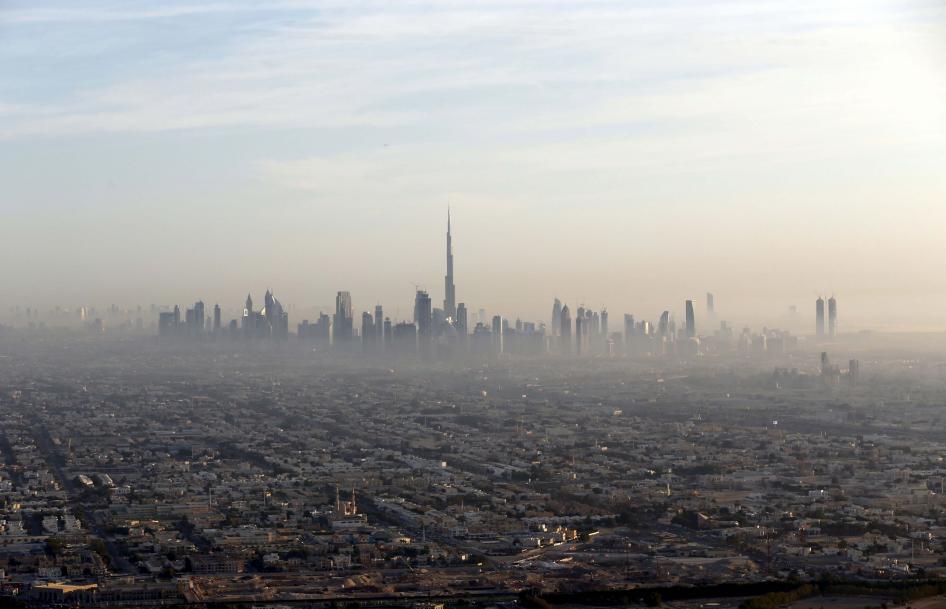Emirati authorities should immediately and transparently investigate the prison conditions of a 21-year-old imprisoned Emirati woman who is reported to have recently attempted suicide, Human Rights Watch said today. Sources close to the woman say that prison authorities subjected her and a second Emirati woman prisoner, 37, to solitary confinement for at least three weeks and denied them adequate medical care.
The woman, Maryam al-Balushi, and the second prisoner, Amina al-Abdouli, are serving five-year sentences in al-Wathba Prison on state security charges. Sources close to the women told Human Rights Watch that Emirati authorities placed them in solitary confinement from about February 17, 2020 to at least March 11, 2020, when news of al-Balushi’s apparent suicide attempt was made public. Both women began a hunger strike around that time. It is unclear whether al-Abdouli remains isolated. Prolonged solitary confinement is strictly prohibited under international law and can amount to cruel, inhuman, or degrading treatment.
“United Arab Emirates prison officials have a track record of mistreating prisoners, including with prolonged solitary confinement,” said Michael Page, deputy Middle East director at Human Rights Watch. “Maryam al-Balushi’s apparent suicide attempt makes clear that UAE authorities cannot brush aside what is going on inside the country’s prisons.”
In a voice recording leaked out of the prison in late January, al-Balushi said that new charges of spreading false information, harming the UAE’s reputation, and causing problems with nearby states were brought against her and al-Abdouli because they had previously sent voice recordings in which they described the conditions of their arrest and detention in 2015. Such charges could lead to new sentencing, thereby prolonging their detention, which was to end in 2020.
State security forces arrested both women on November 20, 2015. In a February 2019 letter to UAE authorities regarding the two women, three United Nations special rapporteurs raised allegations of incommunicado detention, torture and ill-treatment, the use of forced confessions, dismal prison conditions, and denial of appropriate medical treatment. UAE authorities denied the allegations on March 4, 2019.
The special rapporteurs’ letter said that UAE authorities reportedly charged al-Balushi in February 2016 with “financing terrorism” because she had donated money to help a Syrian family in 2014. The authorities charged al-Abdouli in October 2014, almost a year after her arrest, with “inciting hatred against the State and disturbing public order; undermining the reputation of the State institutions and publishing false information to endanger the State’s relations with its allies” because of comments she made on Twitter. These vaguely worded criminal charges are often used in the UAE to curtail freedom of expression and clearly violate international standards.
In September 2019, the annual report of the UN high commissioner for human rights stated that his office had received reports that the women’s conditions had worsened after information was shared with the UN.
Isolation can be psychologically damaging to any prisoner, causing anxiety, depression, and anger, among other effects. Its effects can be particularly detrimental for people in psychological distress.
The stress of a closed and heavily monitored environment, absence of meaningful social contact, and lack of activity can exacerbate psychological distress and have long-term adverse effects on the mental well-being of prisoners. People in solitary confinement frequently attempt suicide or require emergency psychosocial support.
Sources close to al-Balushi told Human Rights Watch that since her arrest at age 19, her health had seriously deteriorated and that she has been suffering from kidney problems that cause her immense pain. Sources say the prison authorities have denied al-Balushi access to the prison clinic since at least December 2018 and that she has not received adequate medical treatment for her condition.
“The UAE authorities are doubling down by punishing detainees for reporting on prison conditions,” Page said.
Human Rights Watch has previously documented serious allegations of violations of due process and fair trial guarantees in the UAE, especially in state security-related cases. These include arbitrary arrests and detention, as well as allegations of torture and ill-treatment at state security facilities.
The denial of adequate medical care in UAE prisons and detention facilities also appears to be widespread. In November 2019, Human Rights Watch documented the long-running denial of regular and uninterrupted access to lifesaving treatment for prisoners living with HIV in Dubai’s al-Awir prison.
In May, Human Rights Watch reported the death of a detainee who had cancer, Alia Abdel Nour, following years of mistreatment and denial of adequate medical care by security forces and prison officials at al-Wathba prison. UAE authorities ignored repeated calls by European Parliament members, United Nations experts, and members of her family for her release on health grounds.
Over the past year, there have also been increased concerns for the deteriorating health of two unjustly detained rights activists, Ahmed Mansoor and Nasser bin Ghaith, who are being held in dismal prison conditions and denied access to health care in Al Sadr and Al Razeen prisons, respectively.
“The apparent attempted suicide of a young Emirati woman in an isolated prison cell is yet another blow to the UAE’s image as a tolerant and progressive country,” Page said. “If the UAE wants to demonstrate any semblance of respect for the rule of law, it should immediately allow international, independent monitors access to its prisons as well as private and regular visits with its prisoners.”



 العربية
العربية